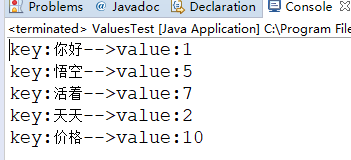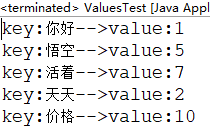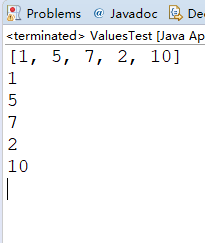HashMap遍歷的三種方式
阿新 • • 發佈:2018-11-21
1.遍歷HashMap的鍵值對
(1)通過entrySet()獲取HashMap的"鍵值對"的Set集合(於Set中無序排放)。
(2)通過迭代方法遍歷集合,再利用getKey(),getValue()方法獲取相應鍵,值。
1.1例項程式碼
package hashmap;
//Map集合獲取元素的三種常見方法 keyset(),values(),entrySet()
import java.util.*;
public class ValuesTest {
public static void main(String[] args) {
Map<String, Integer> 1.2 執行結果

2.遍歷HashMap的鍵
通過keySet()方法,獲取HashMap的所有鍵的Set集合,通過迭代取出所有key,再利用get()方法獲取value。
2.1例項程式碼
package hashmap;
//Map集合獲取元素的三種常見方法 keyset(),values(),entrySet()
import java.util.*;
public class ValuesTest {
public static void main(String[] args) {
Map<String, Integer> map = new HashMap<String, Integer>(); //構建鍵值對為<String, Integer>的Map集合
map.put("你好", 1); //// 將“key-value”新增到HashMap中
map.put("天天", 2);
map.put("價格", 10);
map.put("悟空", 5);
map.put("活著", 7);
//keySet()方法
Set<String> keySet = map.keySet(); //獲取map集合所有鍵的Set()集合(於集合中無序存放)
Iterator<String> iterator = keySet.iterator(); //獲取keySet集合的迭代器
while(iterator.hasNext()) {
String key = iterator.next(); //獲取key值
Integer value = map.get(key); //通過get()方法獲取對應value
System.out.println("key:" + key + "-->value:" + value);
}
}
}
2.2 執行結果

3.遍歷HashMap的值
通過values()方法獲取HashMap集合的所有value的Collection集合(於集合中無序存放)。
3.1程式碼例項
package hashmap;
//Map集合獲取元素的三種常見方法 keyset(),values(),entrySet()
import java.util.*;
public class ValuesTest {
public static void main(String[] args) {
Map<String, Integer> map = new HashMap<String, Integer>(); //構建鍵值對為<String, Integer>的Map集合
map.put("你好", 1); //// 將“key-value”新增到HashMap中
map.put("天天", 2);
map.put("價格", 10);
map.put("悟空", 5);
map.put("活著", 7);
//values方法 遍歷HashMap的values
Collection<Integer> collection = map.values(); //獲取map集合的所有value的Collection(於集合中無序存放)
System.out.println(collection);
Iterator iterator = collection.iterator();
while(iterator.hasNext()) {
System.out.println(iterator.next());
}
}
}
3.2 執行結果

